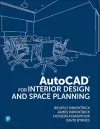
AutoCAD for Interior Design and Space Planning
3 authors - Paperback
£87.30
Wolfgang Holnthoner obtained both his M.Sc. in microbiology and genetics and his Ph.D. in molecular biology from the University of Vienna, Austria. For more than 20 years he has been working on endothelial cells, both from blood and lymphatic vessel origin. After his postdoctoral training with Kari Alitalo at the University of Helsinki, Finland, where he has been exploring signal transduction in lymphatic endothelial cells, he started at the Ludwig-Boltzmann-Institute for Experimental and Clinical Traumatology to work on strategies for pre-vascularization of tissue-engineered constructs. He is interested in the basic functions of endothelial cells in vasculogenesis, angiogenesis, and lymphangiogenesis. His group’s primary focus is the regeneration/engineering of microvascular structures. To this aim, he employs co-culturing primary endothelial cells with supporting cell types to achieve functional oxygen and nutrient support of tissues. Dr. Holnthoner uses the physiological and biocompatible scaffold fibrin to provide cells the necessary 3D environment for microvascularization. In addition, his research involves the integration of lymphatic vessels, since they are the ones that transport the interstitial fluid in tissues back to the blood circulation, and without them, human life would be inconceivable. Moreover, he strives to explore the emerging role of extracellular vesicles (EV) in intercellular communication. These efforts contribute to the development of therapies aimed for regeneration of diseased tissues.
Andrea Banfi directs the Cell and Gene Therapy research group at the University Hospital of Basel, Switzerland. He previously worked in Genova (Italy) and Stanford (CA, USA). His research focuses on: 1) understanding the basic principles governing the growth of blood vessels, particularly the molecular crosstalk between endothelium, mural cells and inflammatory monocytes, in order to identify druggable targets for therapeutic vascular growth; and 2) translating these concepts into novel regenerative medicine approaches, particularly to generate vascularized tissue-engineered grafts and to treat ischemic diseases.
James Kirkpatrick has a triple doctorate in science and medicine (M.D., Ph.D., D.Sc.) from the Queen’s University of Belfast (N. Ireland) and was chairman and professor of pathology at the University Medical Center of the Johannes Gutenberg University (JGU) in Mainz from 1993 to 2015. His prior academic appointments were in pathology at the University of Ulm (1980– 1985), Manchester University, UK (1985–1987), and RWTH (University of Technology), Aachen (1987– 1993). He is a fellow of the Royal College of Pathologists (FRCPath), London (since 1997), and has honorary and visiting professorships in Sweden, China, Singapore, and Cuba. Currently, he is distinguished visiting fellow at the University of Cambridge, UK, and distinguished professor at the Johann Wolfgang Goethe University in Frankfurt, where his current research is being carried out. His principal research interests are in life science aspects of biomaterials in tissue engineering and regenerative medicine, with special focus on human co-culture systems to study vascularization. A special methodological emphasis in his research over the past 30 years has been the development of in vitro cellular systems which have complexity well beyond the simple monocellular system. Thus, how non-vascular cells contribute to the proliferation, differentiation, and architectural organization of microvessel-like structures has xiv About the Editors been a particular focus. For example, his group has pioneered studies which show that cellular crosstalk between osteoblasts or fibroblasts and endothelial cells direct microvessel formation on open porous 3D scaffolds of all material classes (metals, ceramics, and polymers). Kirkpatrick’s research activity has been supported over many years by the German Research Foundation (DFG), the Federal Ministry of Education & Research (BMBF), The German-Israeli Foundation (GIF), and the European Commission (EC).